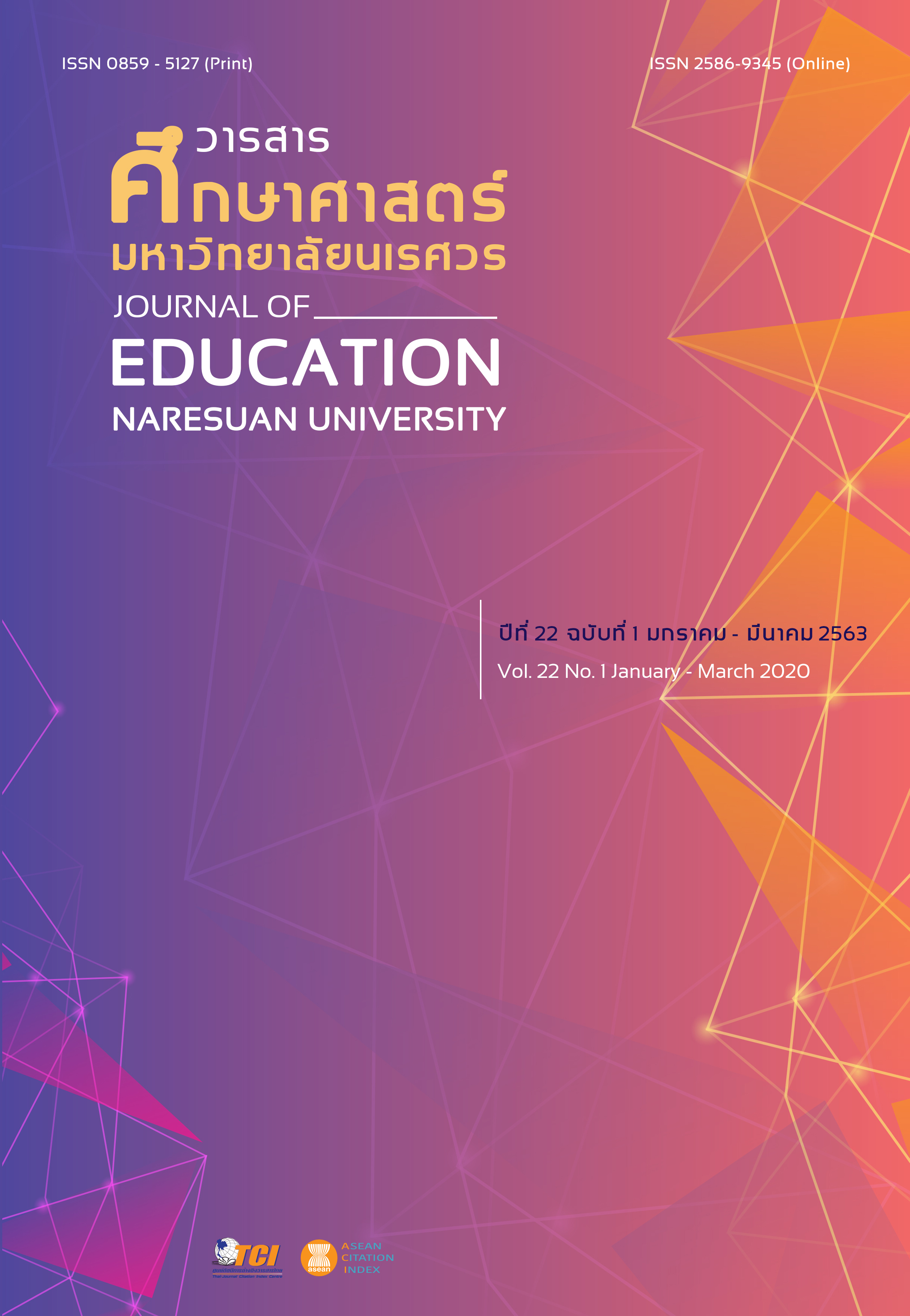AN ACTION RESEARCH TO EXAMINE THE WAYS OF USING MODEL-BASED LEARNING TO ENHANCE 11th GRADE STUDENTS’ COMPETENCY TO EXPLAIN PHENOMENA SCIENTIFICALLY ON FOSSIL FUELS AND PRODUCTS
Main Article Content
Abstract
The purposes of this action research were to examine the ways of using model-based learning (MBL) approach to enhance students’ explaining phenomena scientifically competency on fossil fuels and products and to investigate the impact of model-based learning (MBL) approach on students’ explaining phenomena scientifically competency. The targeted students were 24 people in 11th grade students from the lower part of northern science school who registered in the second semester of 2016 academic year. In the research process, the cycle of PAOR include 4 steps; 1) plan, 2) act, 3) observe, and 4) reflect. The research data were collected by using the three developed lesson plans, the reflection journals in teaching, the activity work sheets and the developed explaining phenomena scientifically competency test. The data were analyzed by using content analysis technique, which this data of each cycle was modified by adding and improvement even to obtain the perfect steps for enhancing this competency. Furthermore, the other is some basic statistics such as mean, and percentage were also used. The results show that, there were noticeable development for students’ explaining phenomena scientifically competency after the developed learning activities using model-based learning (MBL) for the three-cycle process were completed. All the learning activities were developed using the seven steps of model-based learning approach. In each steps was suggested that the teacher should emphasize on the importance of questions to stimulate students to share ideas, to get them into discussion and argumentation, and to support them in various ways during the activities. All steps of the process can improve students’ competency to explain phenomena scientifically.As a result, the students’ competency post-test average score (66.27%) was higher than that of the pre-test one (16.85%) and the students’ competency have been progressed at high level after the three round PAOR cycle respectively.
Article Details
The owner of the article does not copy or violate any of its copyright. If any copyright infringement occurs or prosecution, in any case, the Editorial Board is not involved in all the rights to the owner of the article to be performed.
References
Faikhamta, C., & Suphatachaiwong, P. (2014). Model-based learning. Kasetsart Educational Review, 29(3), 86-99. [in Thai]
Jitaree, R., Uaiy, V., & Keawurai, W. (2017). The development of instruction model based on constructivist learning theory and stem education approach to enhance analysis thinking and scientific literacy for Mathayomsuksa 1 students. Journal of Education Naresuan University, 19(2), 202-213. [in Thai]
Institute for the Promotion of Teaching Science and Technology. (2012). Assessment of science. Bangkok: Se-Education. [in Thai]
Institute for the Promotion of Teaching Science and Technology. (2013). Programme for International Student Assessment (PISA 2012). Retrieved from https://www.ipst.ac.th [in Thai]
Institute for the Promotion of Teaching Science and Technology. (2016). Programme for International Student Assessment (PISA 2012). Retrieved from https://www.ipst.ac.th [in Thai]
Institute for the Promotion of Teaching Science and Technology. (2017). PISA 2015 results. Retrieved from https://drive.google.com/file/d/ 0BwqFSkq5b7zScUJOOV9ldUNfTlk/view [in Thai]
Khongton, T. (2014). Enhancing achievement of learning in organic chemistry topic of Mathayomsuksa 5 students by model-based learning (Master thesis). Bangkok: King Mongkut’s University of Technology Thonburi. [in Thai]
Kijkuakul, S. (2014). Science learning for 21st century teacher. Phetchabun: Juldis Printing. [in Thai]
Klinkla, R., Phibanchon, S., & Srisnyong, S. (2016). The effect of inquiry learning and open approach on stoichiometry chemistry to develop ability in analytical thinking for 11th grade students. Journal of Education Naresuan University, 18(1), 211-217. [in Thai]
Lee, S., & Kim, H. B. (2014). Exploring secondary students’ epistemological features depending on the evaluation levels of the group model on blood circulation. Sci & Educ, 23, 1075-1099.
Office of the Education Council. (2014). Education issue of Thailand in the world. Bangkok: Prikwarn Graphic. [in Thai]
Organization for Economic Co-operation and Development (OECD). (2013). PISA 2015 draft science framework. N.P.: n.p.
Organization for Economic Co-operation and Development (OECD). (2016). PISA 2015 results (Volume I): Excellence 13. and equity in education. Paris: OECD Publishing.
Programme for International Student Assessment (PISA) Thailand. (2010). The results of data analysis: Programme for PISA 2009. Bangkok: Aroon Printing. [in Thai]
Schwarz, C.V., Reiser, B. J., Davis, E. A., Kenyon, L., Acher, A., Fortus, D.,… Krajcik, J. (2009). Developing a learning progression for scientific modeling: Making scientific modeling accessible and meaningful for learners. Journal of research science teaching, 46(6), 632-654.
Srichiangha, C. (2014). Developing grade-11 students' conceptions about chemical equilibrium and attitudes towards chemistry through model-based learning activities (Master thesis). Bangkok: Kasetsart University. [in Thai]


